Fear over the spread of a new coronavirus has made millions of Chinese people remain at home, shortly after the end of the Chinese lunar new year.
The situation is putting a strain on most retail, restaurants, services, tourism industry, and other offline businesses. But is everyone negatively impacted by the virus outbreak?
A blessing for the gaming industry
As people in China are now confined at home, one industry has been benefiting: gaming.
The Baidu Index (reflecting search volume) for the term “gaming” has reached an all-time high since the beginning of the crisis. Searched volume peaked 60% above the previous weekly maximum.
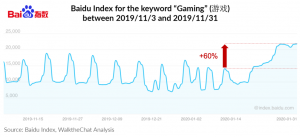
Top-grossing apps include Tencent’s Game for Peace and Honor of Kings.
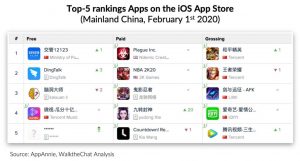
Some games got special attention due to the recent health crisis. The game Plague Inc., which lets players “spread and evolve a deadly plague to bring about the end of the human race,” was one of the winners.

Although this game might seem morbid and insensitive in current times, it has skyrocketed to the top of the Chinese App Store, ranking as the top paid app for the last ten days.

Gaming influencers also saw a big uptake in traffic. Most of them have seen exponential growth of their followers and engagement numbers over the last couple of weeks.
MaoQi, a leading gaming influencer, saw an increase of almost 1 million followers over the last month (a 20% growth month-over-month). The growth clearly became exponential following the outbreak.
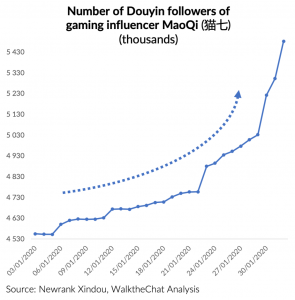
Fitness apps are booming
One of the first measures taken by local authorities to prevent contagion was the closure of gyms across the country. Fitness addicts are left with only one choice to keep their body moving: fitness apps.
Keep is the top fitness app in China. It was ranking around the 260th position of the China iOS App Store before Chinese New Year. It now climbed all the way up to #79, and keeps rising every day.
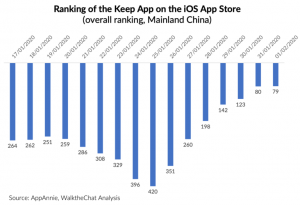
Although all the offline gyms of Keep are closed down until further notice, it smartly used Douyin’s live streaming feature to move the classes online.
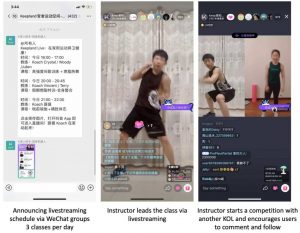
Keep hosts three live streaming classes per day, first announcing them via its hundreds of WeChat groups. Although the classes are free to watch, the Keep instructor asks the audience to follow the account, comment and like the stream. This engagement is picked up by Douyin’s algorithm, which shows Keep to an even larger audience.
With the live streaming campaigns, Keep boosted its followers by 18% in the first five days of the virus’ outbreak to 258,000 followers.
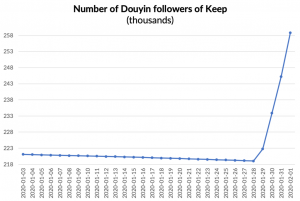
Nintendo Switch’s fitness ring is another prized item as people are stuck at home.

The fitness ring sells for around RMB 550. But resellers are now selling it for more than RMB 800, sometimes even more than RMB 1,500, and they are still collecting thousands of orders.
Online health services are seeing a surge of activity
Naturally, one of the positively impacted segments is online health services. WeChat recently added a new “Health” segment to its WeChat Wallet menu.
The “Health” section includes the ability to track in real-time the epidemic data of every district in every province. It also enables, among other things, booking online consultations with doctors.

The most in-demand doctors for online consultations are virologists.
According to Technode, the telemedicine services from Ping’an, JD, and Alibaba have also seen a peak in usage.
Enterprise collaboration apps are becoming essential
Fun is not all there is. The Chinese New Year holiday is drawing to an end, and some of us have to get back to work. However, most companies have set up remote work policies to avoid cross-contamination among their workers.
This is an amazing opportunity for enterprise collaboration apps to facilitate remote-working. Alibaba’s Ding Talk skyrocketed to the very top of the App Store in a few days.
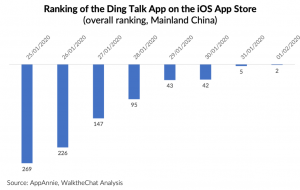
WeChat Work, the enterprise communication app from Tencent, just released a set of new features specifically aimed at facilitating remote work during this critical period:
- Online meetings up to 300 people
- Live streaming
- Upgraded forms to collect information about staff during the epidemic
- Specific “epidemic” section in the WeChat Work third-party app store, with relevant apps and special discounts

A new breed of influencers
The epidemic has also created a wave of support for Wuhan and the rest of China. Some influencers who have been actively supporting the anti-virus efforts saw a boost in their engagement and follower growth.

Many of the trending influencers on Douyin are sharing news about the outbreak. The most popular trending influencer as of February 3 is Tu Lei, who has been sharing daily news, commentary, and inspirational videos about the virus during the last couple of weeks. His follower numbers rocketed as a result.
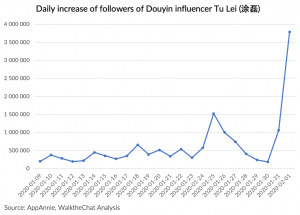
Tu Lei gained up to 3 million followers daily as a result of his messages related to the Wuhan epidemic.
Cross-border e-commerce peaking
The “Shopping” category’s rankings by App Annie shows that two of the top five apps are cross-border e-commerce Apps as of February 3.

The two cross-border apps in this list, Omall and Haitun, have seen a clear rise in engagement and skyrocketed to the top of the App Store.
Omall jumped from #161 to #2 on the iOS China App Store shopping category. It did so in less than two weeks.
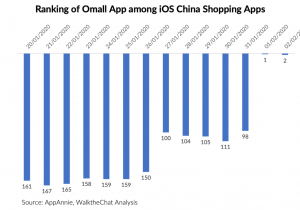
Haitunjia saw a less explosive but still significant rise from #23 to #5 on the App Store in just 12 days.
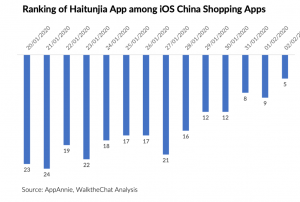
One of the reasons for this boom in cross-border e-commerce is that many Chinese residents are looking for supplies such as face masks, which are now unavailable in China. Such products saw hundreds of thousands of orders on these cross-border platforms over the last weeks.

Conclusion
The coronavirus has changed the way of life for many people in China over the last few weeks. This change in consumption patterns is also boosting some industries.
As an old Chinese saying goes, a crisis is a combination of risk and opportunity. And a lot of tech companies are seizing this opportunity for growth.
This post originally appeared on WalktheChat, a marketing and IT agency focusing on helping overseas brands to sell their products and services via WeChat and Weibo.

